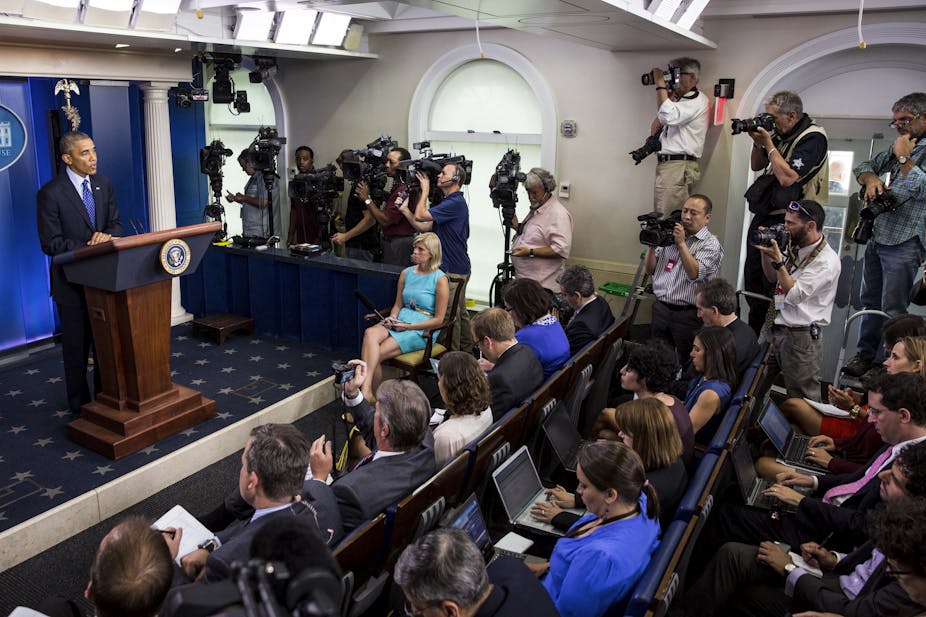Digital mass surveillance is having a chilling effect on US democracy, affecting journalists and lawyers, a report from human rights organisations has warned.
The report, by Human Rights Watch and the American Civil Liberties Union, concludes that some of the most fundamental freedoms are under threat. The organisations argue that the government’s policies on secrecy and preventing leaks, as well as its stance on officials talking to the media, undermine traditional US values.
Press under threat
When it comes to journalism, the Snowden case has already had an impact in a number of high-profile cases. In July 2013, staff at the Guardian had to destroy hard drives containing files leaked by Snowden under threat of action from the UK government. In February of the same year, David Miranda, partner of former Guardian journalist Glenn Greenwald, was held at a London airport for nine hours under the UK Terrorism Act, because of Greenwald’s association with the Snowden case.
These concerns do indeed appear to be playing out in the industry. In 2012 alone, the US federal government reclassified 95 million pieces of information. It’s not clear how many of these were made more or less secret but overclassification is becoming a concern. It has been estimated that between 50% and 90% of classified documents could be made public without them posing a security threat.
The Obama administration has also used the 1917 Espionage Act to routinely target whistleblowers. Under the current presidency, eight people have been pursued for leaking information to the press, including Edward Snowden and Chelsea Manning, the WikiLeaks source. Just three such prosecutions were pursued between 1917 and Obama’s election.
“We’re not able to do our jobs if sources are in danger”, a national security reporter told Human Rights Watch and the ACLU. These concerns are in turn leading to increasing use of encryption technology among a significant number of journalists interviewed for the report.
But while the use of some tools such as the Tor browser or the PGP encryption service to secure emails can definitely reduce the risk of being exposed to government surveillance, the report notes that many journalists fear they are not completely safe. This was a fear raised by Pulitzer Prize-winning reporter Erich Schmitt when he warned that asking sources to protect their digital communication can actually attract more attention to their communications. Others reported having to pay for encryption technologies out of their own pocket and while some journalists are being trained to use them by their employers, others are having to do it alone.
These difficulties are also affecting public discourse, especially in the United States. If sources are reluctant to talk, information doesn’t get through to the public. When it comes to reporting national security issues, several journalists described the climate in the US as comparable to what they might come up against in more authoritarian countries. Journalist Peter Maass is quoted in the report as saying he is “horrified and outraged” by the situation, revealing that he has the same problems working as a reporter in the US as he did in the former Soviet Union and North Korea.
Similar concerns are expressed in the report by lawyers, who warn that client confidentiality is at risk. “I don’t send any information by email, attachment, or phone”, says one interviewed defense attorney, “I don’t use GChat or WhatsApp for anything but ‘Hi, what’s up?’. I don’t even talk on Skype.” By contrast, the government officials interviewed for the report backed NSA surveillance.
In October 2013, the Committee to Protect Journalism released a report denouncing the dangers which journalism is exposed to in the US in the wake of the Snowden case, coming to similar conclusions as the two human rights organisations. And it came to no surprise for some to see the NSA listed in the 2014 Reporters Without Borders Enemies of the Internet report.
This report is not the first to raise concerns about the future implications of what we have learned from the Snowden leaks but it gives us a broader picture of the magnitude of the case. Snowden himself has accused the NSA of setting fire to the future of the internet but now it seems journalism and the legal profession are in danger too.
In fact, the Snowden case implicates every field of our constantly connected and wired society, especially when it comes to digital communication through commercial and popular tools and social media. We should be outraged but we should also use the case as evidence in the fight to narrow the scope of surveillance, reduce government secrecy and better protect national security whistleblowers – as well as the lawyers who defend them and the journalists who tell their stories.

